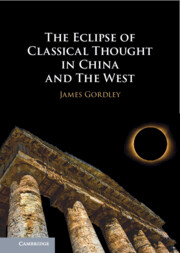Book contents
- The Eclipse of Classical Thought in China and the West
- The Eclipse of Classical Thought in China and the West
- Copyright page
- Dedication
- Contents
- Acknowledgments
- 1 The Dilemma
- Part I Two Ancient Traditions
- Part II The Formation of Two Constitutions
- Part III The Eclipse of Classical Thought
- 10 Neo-Confucianism
- 11 The Path to Orthodoxy
- 12 The Rise and Fall of Western Rationalism
- 13 The Search for Alternatives
- 14 Conclusion
- Appendix The Encounter with the Abrahamic Religions
- Index
10 - Neo-Confucianism
from Part III - The Eclipse of Classical Thought
Published online by Cambridge University Press: 26 July 2022
- The Eclipse of Classical Thought in China and the West
- The Eclipse of Classical Thought in China and the West
- Copyright page
- Dedication
- Contents
- Acknowledgments
- 1 The Dilemma
- Part I Two Ancient Traditions
- Part II The Formation of Two Constitutions
- Part III The Eclipse of Classical Thought
- 10 Neo-Confucianism
- 11 The Path to Orthodoxy
- 12 The Rise and Fall of Western Rationalism
- 13 The Search for Alternatives
- 14 Conclusion
- Appendix The Encounter with the Abrahamic Religions
- Index
Summary
In China, the classical tradition was eclipsed by the rise of those whom Chung-yin Cheng called the “later Neo-Confucians”: adherents of the School of Principle founded by Cheng Yi and Zhu Xi, and of the School of Universal Mind founded by Lu Hsiang-Shan and Wang Yangming. In the late Song dynasty, the School of Principle was declared to be the orthodox interpretation of Confucianism. The School of Universal Mind was its leading opponent. Nevertheless, “[it] is natural,” as Cheng said, to consider them a group apart. They both “deviated from Classical Confucianism in two important respects; First, they completely objectified human reason into a nonhuman order of things” – a doctrine that the School of Principle formulated and “Wang Yangming subjectivised” by identifying principle with the mind. “A second deviation concerned the status of human nature in relation to its ideal of perfection and development.”
- Type
- Chapter
- Information
- The Eclipse of Classical Thought in China and The West , pp. 207 - 227Publisher: Cambridge University PressPrint publication year: 2022

